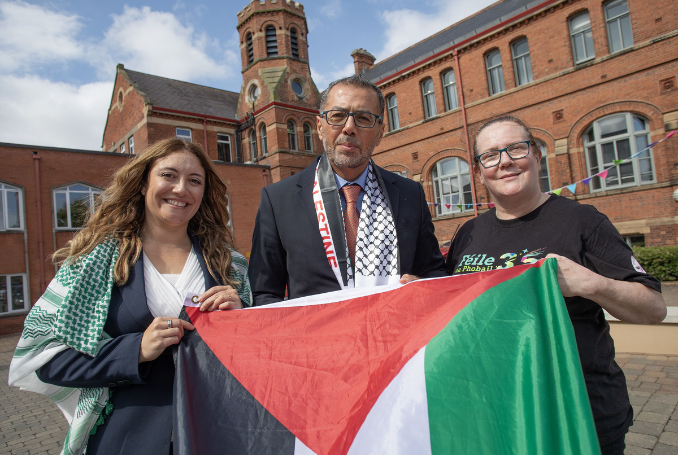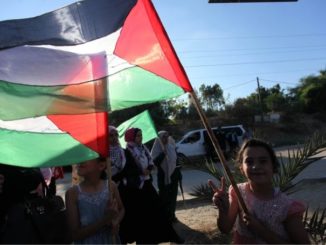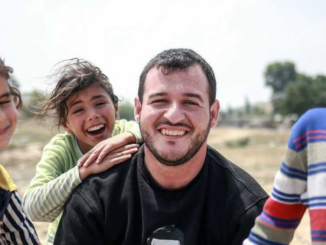
By Joe McCann
This interview was originally published in BelfastMedia.com
In an interview organized through the Ireland-Palestine Solidarity Campaign and Jews for Palestine-Ireland, Ramzy Baroud spoke about his work in establishing the Palestine Chronicle news network which he was determined would give a voice to ordinary Palestinians.
This year’s Palestine Day as part of Féile an Phobail was a resounding success which came to a close with a talk from renowned Palestinian author and editor of The Palestine Chronicle, Dr. Ramzy Baroud.
In an interview organized through the Ireland-Palestine Solidarity Campaign and Jews for Palestine-Ireland, Baroud spoke about his work in establishing the Palestinian news network which he was determined would give a voice to ordinary Palestinians. He also spoke about his thoughts on the current Israeli government and on Ireland’s longstanding solidarity with Palestine.
On Media
Baroud said The Palestine Chronicle began as a blog in 1999 and eventually grew into a newspaper. Today it is one of the most widely read publications and rivals Israeli media in terms of readership. It publishes in several languages including English, French, and Italian.
Ramzy said he started The Chronicle due to frustration because there was no media that was representing ordinary Palestinians living in Palestine.
“It arose from a sense of frustration as a website from Palestinians who didn’t have any form of media that mattered or would represent them, this was before the Second Intifada which was in 2000.
“I started it on my own and began asking people if they wanted to contribute but we gathered an audience so quickly and with time we established the newspaper. (…) We recently launched our Italian version of the newspaper and daily we get people coming to us from over 55 different countries. What has made our coverage so great is that while we use sources from official Palestinian news networks we bypass the factionalism and ideology which can come with that.
The Palestine Chronicle was determined to cut through the press statements and ideological spin, to report the news as it was happening on the ground, in a way which would be relatable and understandable to ordinary Palestinians.
Baroud said:
“Often the news from the official agencies will feature the meetings of delegations, declarations of ministers, etc but ordinary people who are not part of the political apparatus do not factor in the news. In international media, Palestinians only appear either as terrorists or as victims but even that victimization is often characterized as an Israeli reaction to something, so they’re painted as victims but as if they asked for it or deserved it.
“If you go to Gaza now, while bombs are not falling, yes there is a siege but people are living everyday lives, going to school and work and meeting friends. So as well as covering the events like ‘A Palestinian was killed in Hebron’ we also have news about a horse race in Gaza or a group of women launching a food drive. We want to present Palestine as Palestinians would like it to be portrayed to the rest of the world.”
He added:
“Before the rise of Palestinian media people primarily got their news through the Israeli media and while there is left-wing and right-wing media in Israel, even the more liberal forms of their media are still Zionist. There are a few Israeli journalists who are quite good but they do not speak as or for Palestinians and do not convey what it is to be Palestinian.”
On the Israeli Government
Speaking on the current far-right Israeli government which contains cabinet members including Finance Minister Bezalel Smotrich, who has recently described himself as a ‘fascist homophobe’, Dr Baroud said he cannot see the current political trajectory changing towards Palestine but hoped that the Israeli government’s extremism would lead to it being exposed internationally.
On ‘The Age of Monsters’
Dr. Baroud said he views the current climate in Palestine as being on the cusp of change with a new generation of Palestinians emerging who want to end the factional politics and also replace the old political guard who is no longer serving a political purpose.
“Antonio Gramsci said that when the old refuse to die and the young are yet to be born – this is when terrible things happen – we are now living in that ‘age of monsters’. There is a new young generation coming out of Gaza and Jenin who want to move away from the politics of old, but the old political players have money and power and are refusing to step aside to let new ideas through.
“It is my sincere hope that Israel will be exposed more and more for what it is and that liberal democracies will have to make a moral choice. They are more and more realising that the Israel they support is not the liberal democratic Israel of the past. Palestinians need to find unity and end factionalism, we can’t carry on divided as the geo-politics of the Middle East is changing but are starting to see that coming to an end.”
On Irish Solidarity
Baroud said his hope for the future was to see a centralized Palestinian voice which would speak as one and also thanked the Irish people for their support of Palestine throughout the years.
“I want also to convey my immense appreciation for Ireland and the Irish people. Solidarity with Palestine has ebbed and flowed in other countries over the years but Ireland has always been there and has been a pillar of solidarity for Palestinians throughout the generations and we are very appreciative of that.”







